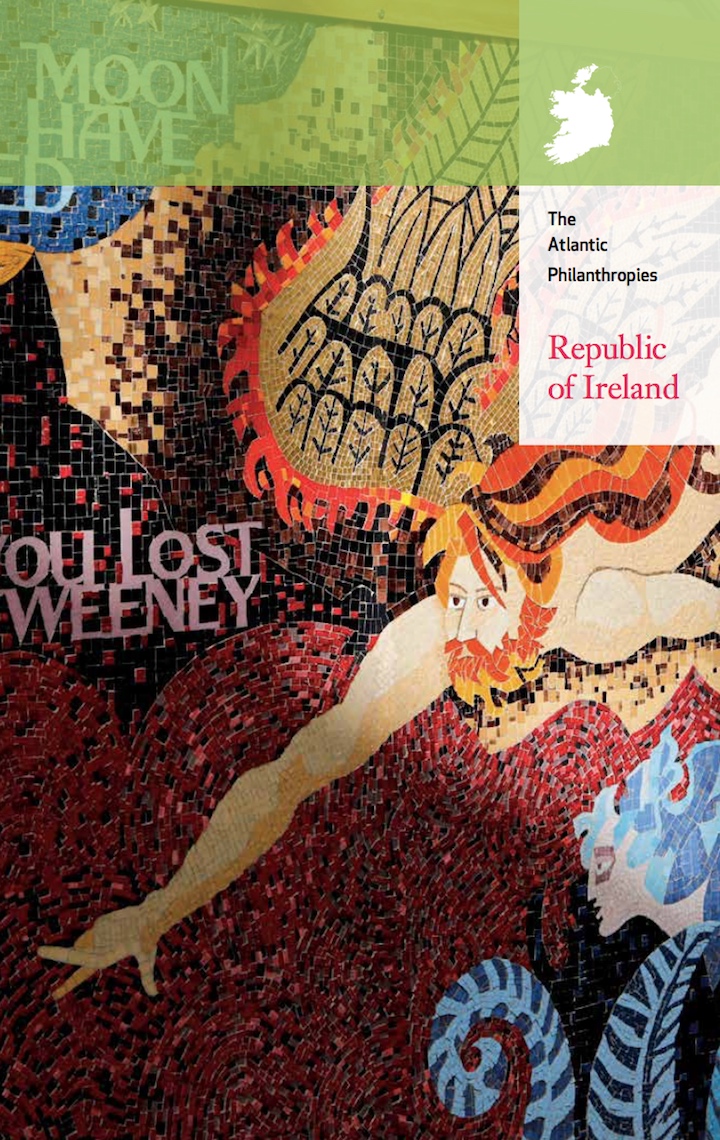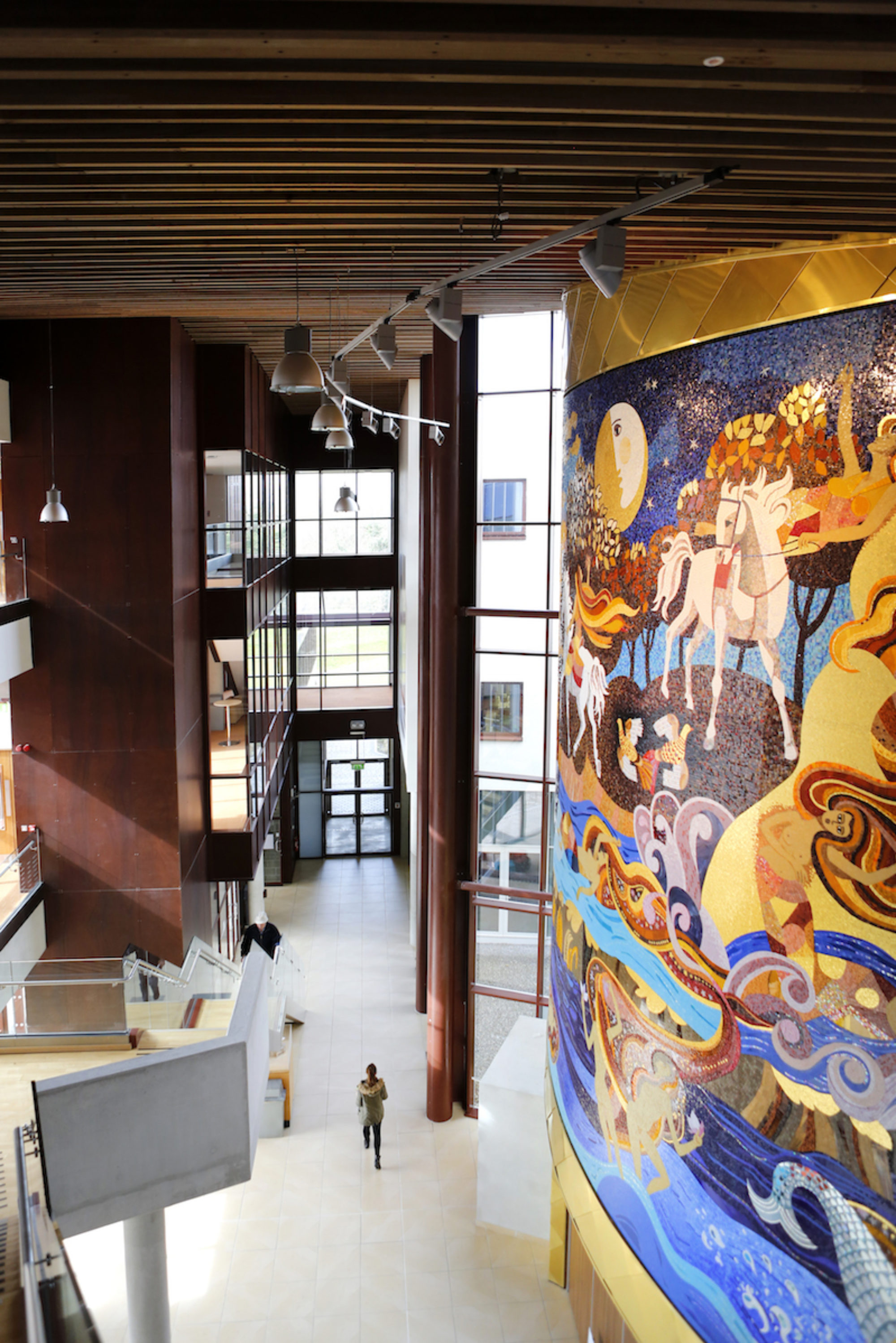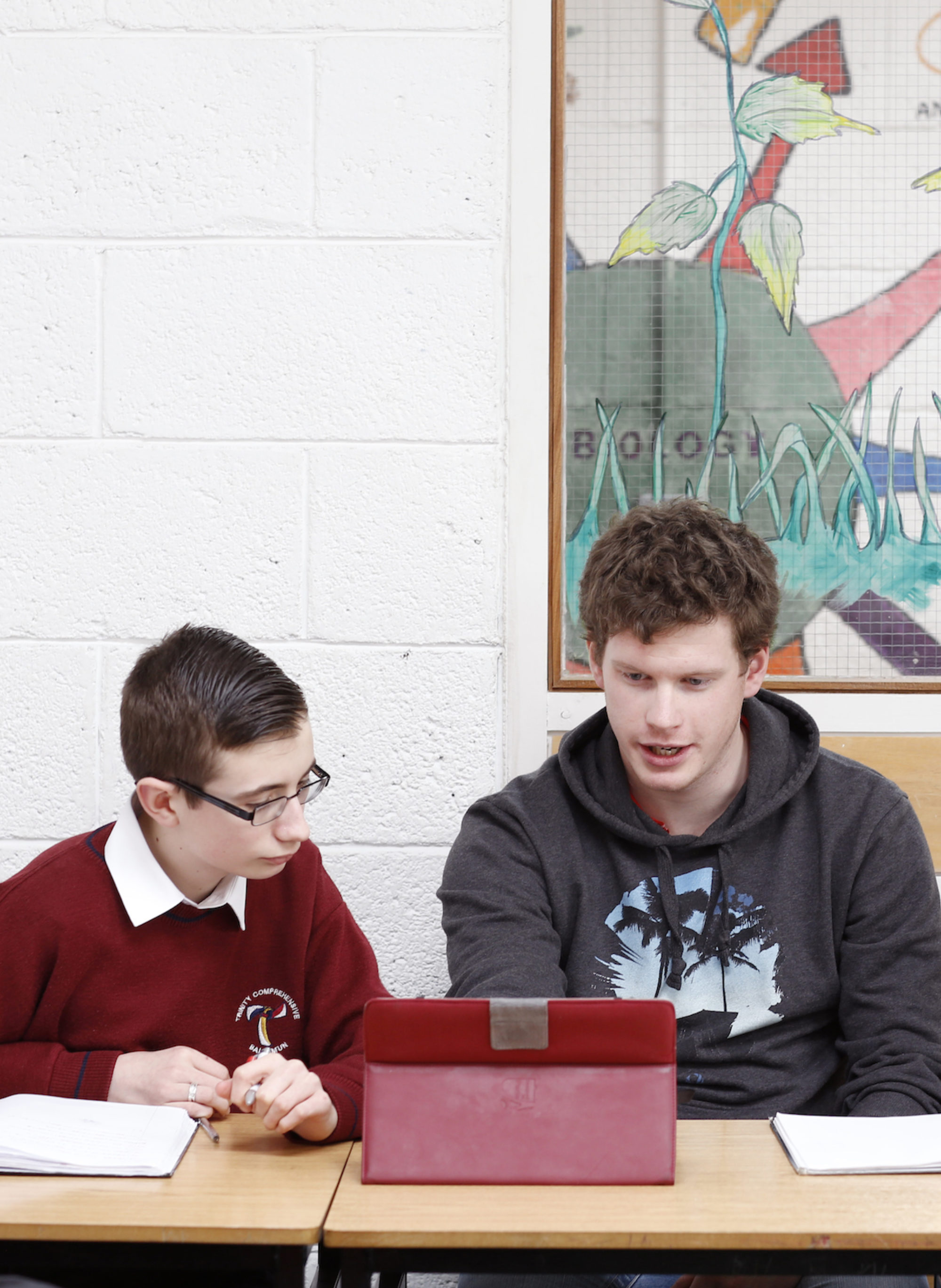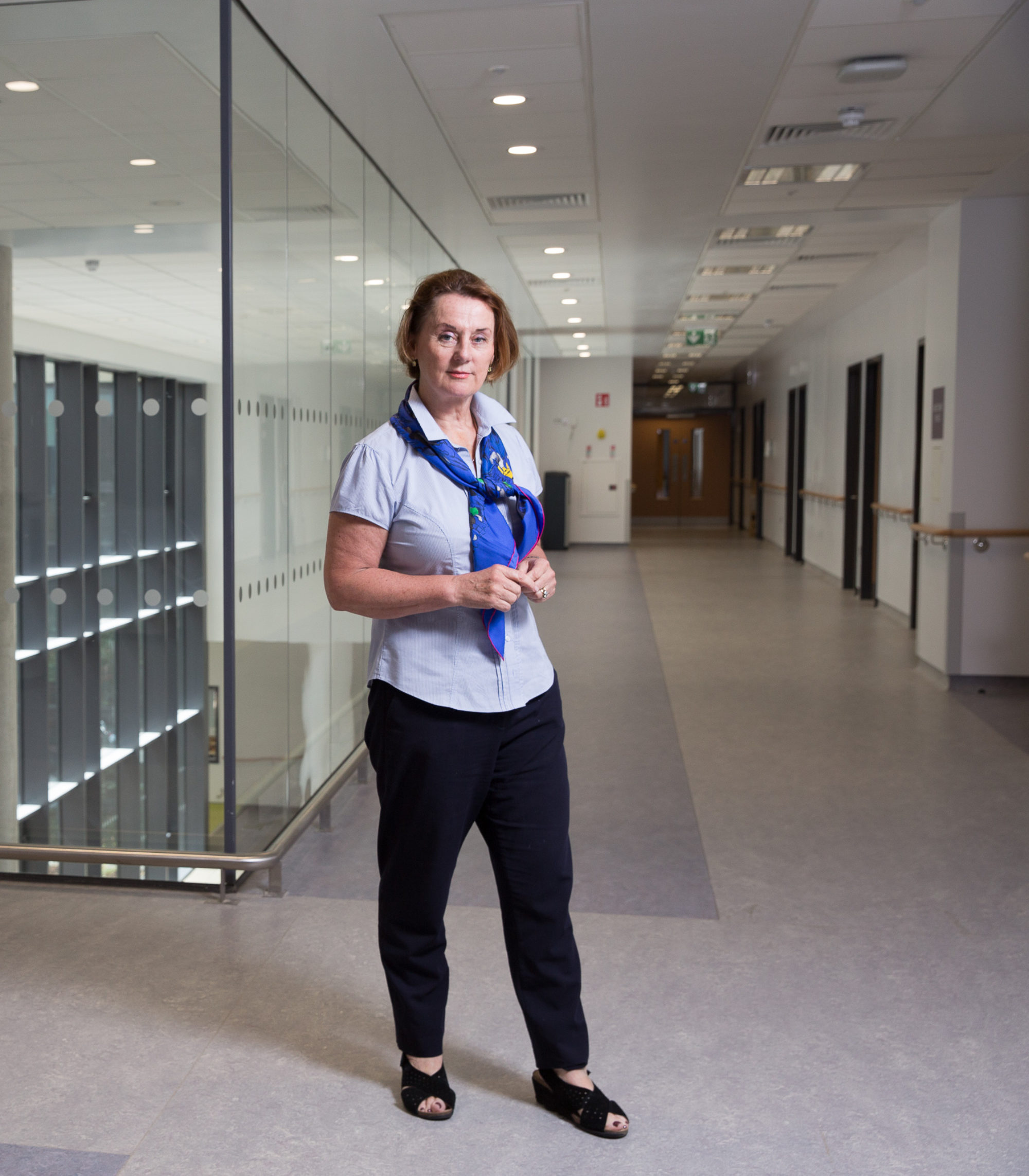Country Book Republic of Ireland
About the Book
The Story.
The Impact.
The Lessons.
This book tells the story of The Atlantic Philanthropies’ 30 years of grantmaking in the Republic of Ireland.
Topics Covered:
- Why Ireland?
- People and groups the foundation supported.
- What Atlantic’s grantees accomplished.
- Lessons from the work.
Read how the foundation helped breathe life into the nation’s university system and its research capabilities, supported major advances in human rights, and worked with government to improve services for children and older adults.

Summary
An Elusive Role
Despite the enormous presence in the form of buildings, social programs and policy advances, the role of The Atlantic Philanthropies in the Republic of Ireland remains, to some extent, elusive.
While Irish people will instantly recognize both the name of the foundation and its founder Charles F. (Chuck) Feeney, the sheer scale of their work over the last 30 years, more than 1,000 grants, totaling over €1 billion, has somewhat obscured the enormous contribution they have made in so many ways to this country.
The evidence is on university campuses around the country, and in programs for the young, the old and the disadvantaged, as well as fundamental social change, such as children’s rights and marriage equality, which Atlantic helped to foster.
Early Days in Limerick
The Atlantic Philanthropies story in the Republic of Ireland really began in Limerick, a city that, back then, was down-at-heel and unloved. It was a place where Feeney knew Atlantic could make a “real difference.” Based on a chance encounter with visionary leaders who wanted to turn a local college of higher education into a full-blown university, Feeney knew that here he could watch the physical progress of the University of Limerick as it played to the strengths of the people, particularly their prowess at music and sport.
It wasn’t all about money either. It was about opening doors to leading thinkers in education, science, research; it was about identifying areas where funding was lacking; and it was about bringing in partners and raising money to co-finance projects.
To get everyone to buy into a shared vision to transform higher education, Atlantic asked the Irish government to match its initial contribution of €93 million.
Setting Sights on Higher Education
In 1998, the leaders of Atlantic concluded that they could make a sustainable and lasting contribution to building a knowledge economy in the Republic of Ireland by helping create a strong third-level education sector. To make real change, it was necessary to attract top class academics and researchers and give them the facilities and the tools to allow them to bring university standards more into line with European averages and embark on world-class research programs.
Having the initial Atlantic contribution of €93 million matched by the Irish government was a strategy to raise the game and get everyone to buy into a shared vision to transform higher education.
This led to the creation of the Programme for Research in Third Level Institutions (PRTLI), in which Atlantic ultimately invested €177 million over three cycles between 1999 and 2001.
The investment in higher education was the beginning of a virtual avalanche of more than €1 billion of funding that would see the physical projects and an increase of research scientists and programs that had characterized the development of the University of Limerick replicated on all Irish campuses.
Changing the Focus
In 2002, two decisions changed the way Atlantic did its business: The first was to move away from funding higher education; but the second was even more transformative, to spend the entire endowment by 2016. Atlantic now had a finite lifespan.
The new programs focused on aging, children and youth, population health and human rights—issues chosen, not only because of their fundamental importance, but because Atlantic believed it could make a real impact in those areas in its remaining years of grantmaking.
In broader terms, the strategy was to move away from the physical aspect of building programs and concentrate its energies in partnering with existing organizations already working in these sectors. Funding helped to strengthen existing organizations, to bring in professional expertise, to develop their role in advocacy, and to encourage some to join together rather than compete with each other.
The focus on outcomes rather than activities was crucial to making grantees more professional and sustainable in the longer term.
What is striking about Atlantic is the quiet, methodical ways staff went about their business in the Republic of Ireland. Senior figures in the organization say that, while Chuck Feeney expected results, good thinking and “informed activity,” he did not dictate the direction that the foundation took. This was left to the Board and senior executives. It was a culture, they believe, that also often carried through to grantee organizations.
Timeline
Atlantic in the Republic of Ireland, 1982 - 2018
-
1982
The Atlantic Philanthropies founded
-
1987
First Grant for Republic of Ireland (Irish American Partnership: $250,000)
-
1990
Dublin office opens as Tara Consultants
-
1997
Sheds anonymity
-
1998
First partnership with Irish Government; launch of PRTLI
-
2002
Atlantic Board decides to make Atlantic’s final grants by 2016
-
2008
Atlantic begins funding The Irish Longitudinal Study on Ageing (TILDA)
-
2012
All universities of Ireland confer their first-ever joint Honorary Degree to Chuck Feeney
-
2014
Atlantic reaches €1 billion in grants in Ireland
-
2015
Establishes Global Brain Health Institute at Trinity College Dublin and UCSF in U.S.
-
2016
Last grant in Republic of Ireland (Irish Trust for Civil Liberties, Human Rights and Fundamental Freedoms: €500,000)
-
2018
Dublin office closes

Top Lessons
Our Top Takeaways
Lessons from Atlantic’s work in the Republic of Ireland are many and varied and offer pointers we hope are useful to other donors:
- It is not all about money. It is also about ideas, opening doors and doing high quality research before making investments.
- Selecting the right people to create and implement a vision is as important as the vision itself.
- Focus on the outcome rather than the organization. That means setting goals for grantees and rigorous evaluation, but also providing the necessary back-up from the foundation to ensure the grantees achieved their mission.
- While the Atlantic's scale was vast, their strategic “partnering” with government and with other foundations was a vital part of the process.
- No organization can do everything, so it is vital to know what you want to do and who to do it with.
- Atlantic's legacy contains many lessons for less well-endowed organizations where giving a little with care and precision can make a big difference.

Grantee Stories
Our grantees have stories to tell.
The book includes a series of vignettes with personal stories from these grantees:
- Northside Partnership
- Doras Luimní
- Alzheimer Society of Ireland
- Glenstal Abbey
- Mercer’s Institute for Successful Ageing
- Genio
- Children’s Rights Alliance
- National University of Ireland, Galway
- Nasc

Download
Read it now.
The Atlantic Philanthropies: Republic of Ireland tells how Atlantic’s investments had an extraordinary impact on the country—from helping breathe life into the nation’s university system and its research capabilities, to supporting major advances in human rights, and spurring the government to improve services for children and older adults.
Download the full book (PDF) ›
Further Reading
